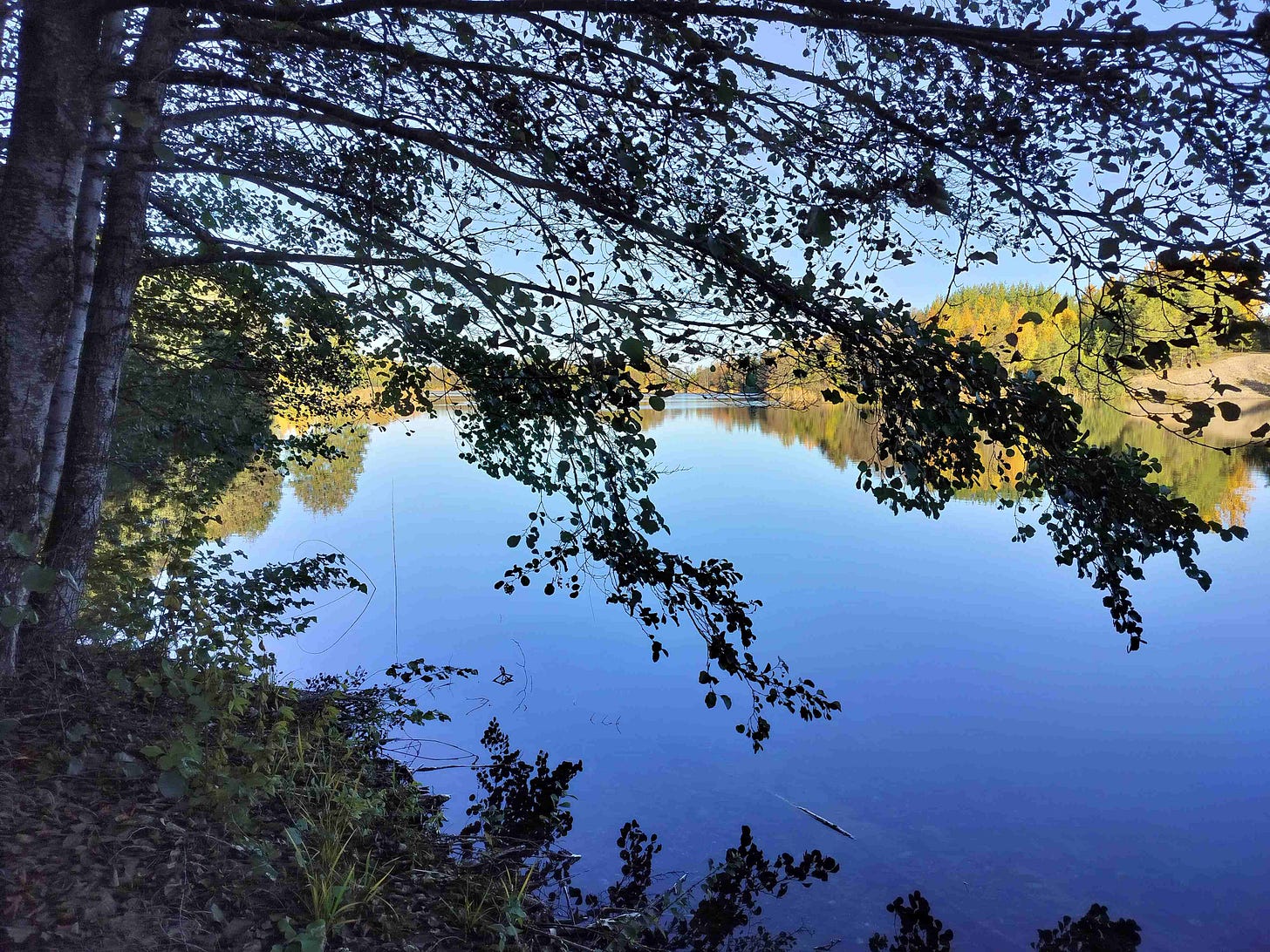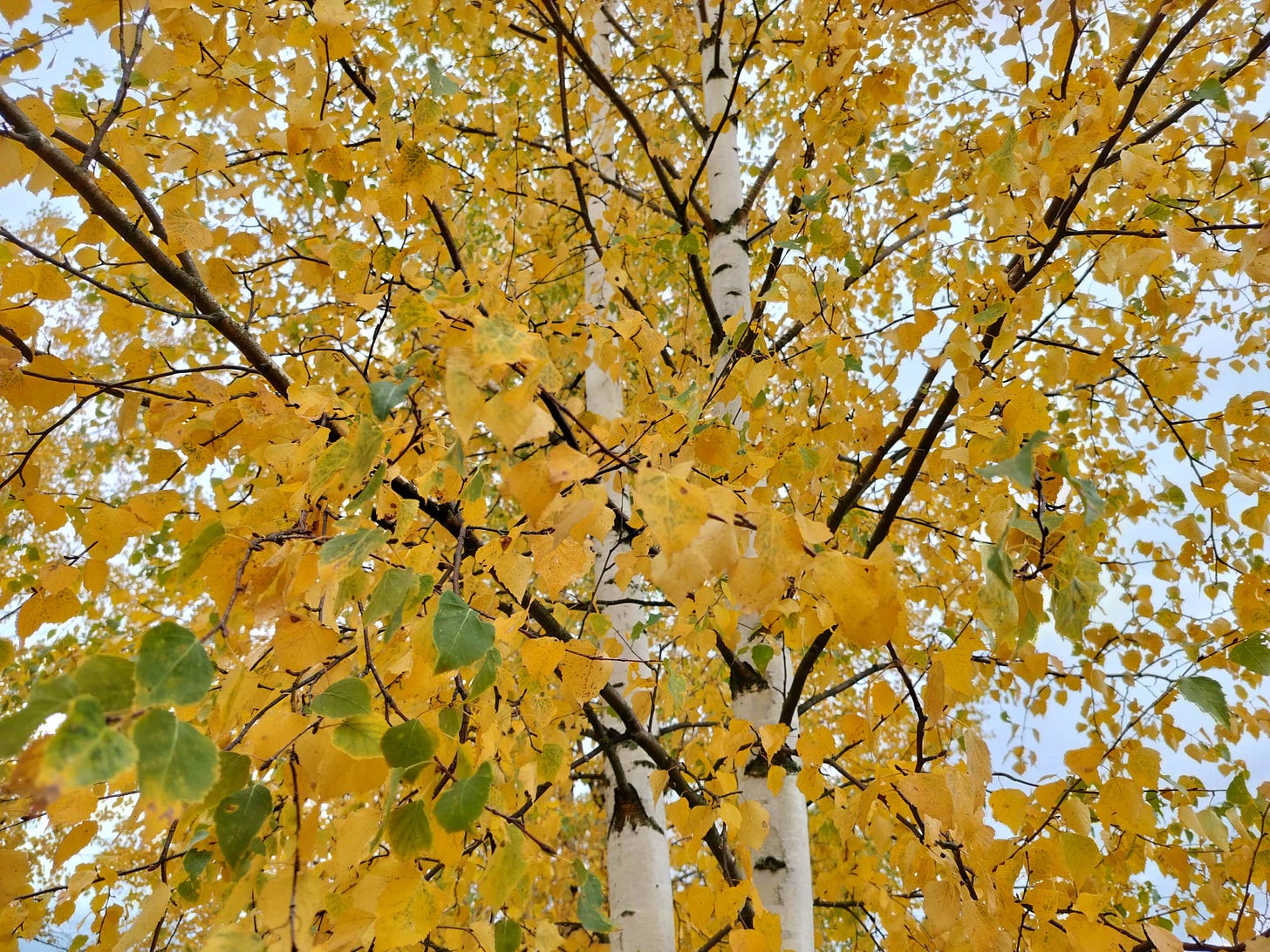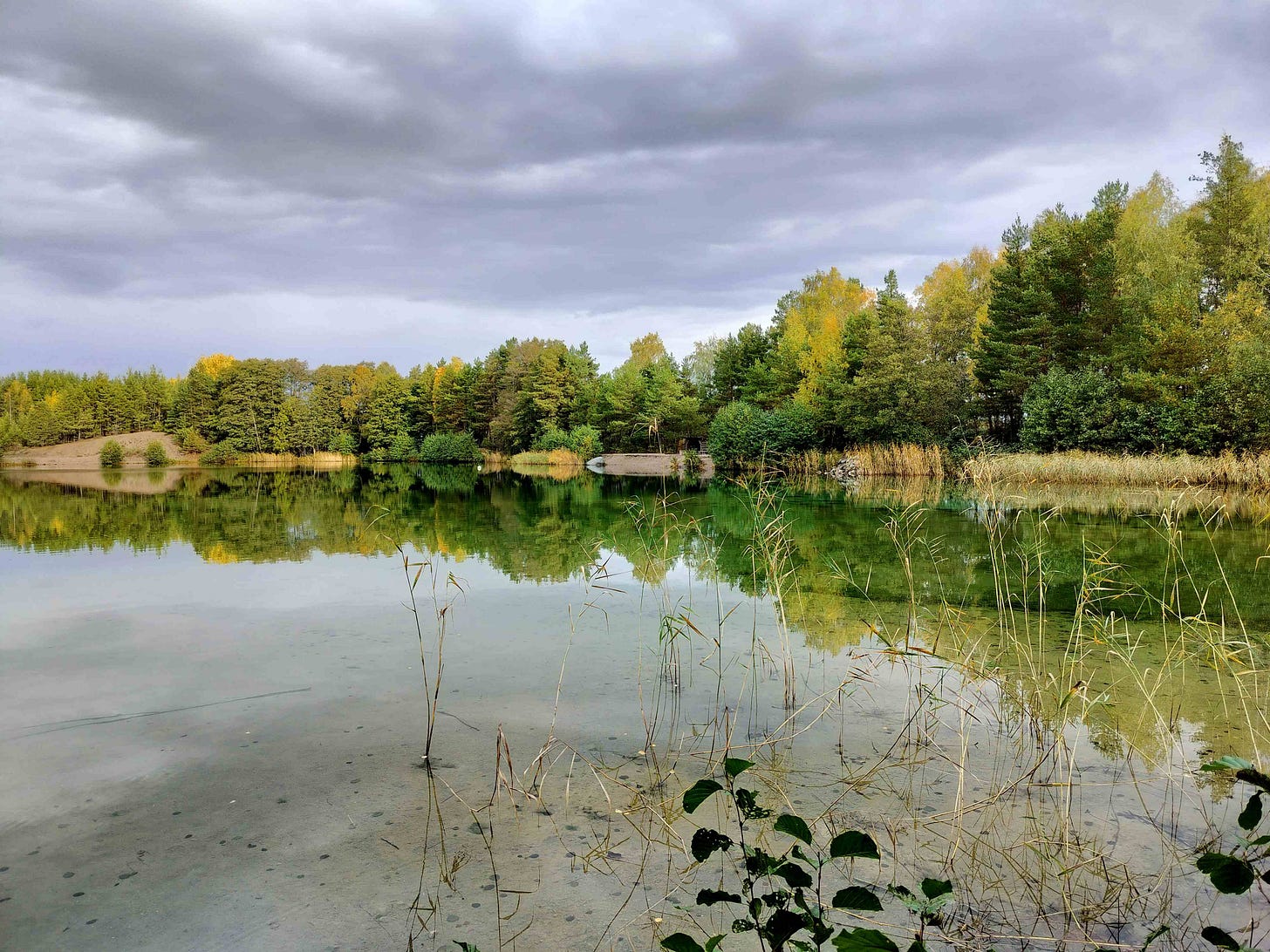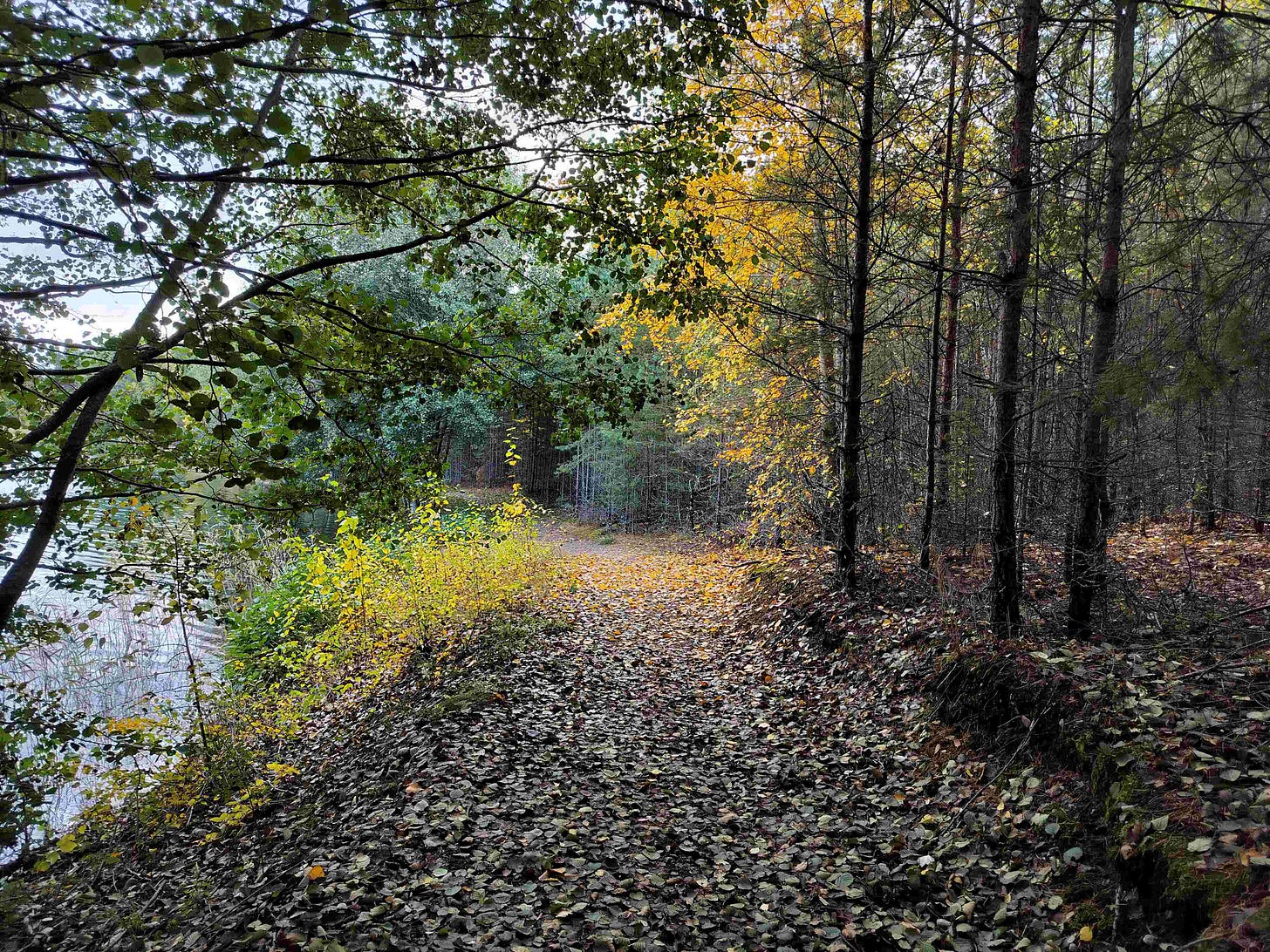Building the Bridge Inside
Coming to Terms with Being an American
Like you, I am concerned about the upcoming U.S. election and the impact of its outcome on America and the world. Although this election is exceptional, it is also about what all U.S. elections have always been about: what does it mean to be an American?
The following piece reflects my personal odyssey of being an American based on thoughts that have struck me on recent morning walks around a lake near my island west of Stockholm, Sweden. It is intended to contrast with the election news, another way to approach America and Americanness that can raise questions, not about one party or another, but about the whole. Hopefully, it can also provide perspective, comfort, and inspiration to those in despair.
I’ve included images of nature from my walk, which could be scenes from many places in America. We share so much in common and find ourselves through one another. Enjoy.
When I was a child growing up in many countries around the world due to my father’s job as an international banker, American elections and their meaning for the country and the world mostly passed me by.
Dad, an American who grew up with limited means as the first son of Scottish immigrants in what he called “the unforgettable borough of Brooklyn” during the 1930s and ´40’s, insisted that all politicians were crooks and that you shouldn’t trust your own mother. Naturally, he assumed I would not apply the latter to my own German mother. He told me not to bother too much with tax forms. “Just write 0 at the bottom of the form and sign it,” he said, which I did for years when I was younger until I discovered this was not the way to fill in your tax forms. He was not a tax evader himself but made his life choices based on an unswerving determination to give as little as possible to the Internal Revenue Service.
You could say that, from the outset, my opportunities for developing a sense of civic responsibility and any substantive attachment to the United States were limited. Yet, I was an American citizen, albeit born in Rio de Janeiro, and made to understand that the navy blue passport with the spread eagle on it, rather than the green Brazilian one that I received by right of birthplace, was what counted.
Early in life, my parents tried to keep me and my younger sister away from images of the Vietnam War still being waged while we were living in Asia in the early 1970s. Instead, when we visited the Pacific rim of the United States on the island of Maui on holidays, my sister and I lay on our stomachs in front of the black-and-white television, binging on replays of “I Dream of Jeannie” and “Gilligan’s Island” while sinking our teeth into cushions of cavity-inducing Bubble-Yum. In this sugar-sweet comfort zone, the disturbing images which I had caught sight of anyway on the front page of my father’s morning newspaper and television seemed distant: soldiers jumping out of helicopters, coffins wrapped in the American flag, long-haired hippies in bell-bottoms protesting on Pennsylvania Avenue in Washington D.C., and Asian people burning. My immediate experience of America was instant feel-good, a place of limitless fun things, which the places we lived in, with their comparatively meager wares and poor Western imitations, could not offer.
On occasions when we visited my father’s sister on Long Island, Dad looked tortured by the proximity to his origins. Every ten minutes, he left the big family meals that went on for hours to take a walk. On occasions when I followed along with him, he was stumped for words. There was something in his experience of America that was dark, dangerous, and depressing that he had sought to get away from throughout life. When I asked him what was the matter, he only shivered and held my hand. Spooked by this behavior, I was relieved to return to my aunt’s house, where I could play with the other children in a paradise of non-stop jelly beans, Cool-Aid, family baseball, Twister, and Barbie. Couldn’t Dad see how lucky my cousins were to live in this American spaciousness and plenty where people lived happily in an endless flow of entertaining stuff?
In an American school I attended in Hong Kong, I gained my first taste of the responsibilities that American life might incur. Each morning, with all the other students in what seemed then the biggest assembly hall on earth, I had to put my hand on my heart and recite a pledge of allegiance to the United States of America, one nation under God, indivisible with liberty and justice for all. It was powerful to recite these words with so many others. My heart always beat faster, even if I couldn't say what being American meant beyond the consumer heaven I had encountered on our holidays.
Immediately after assembly, I returned to my classroom, where my teacher, Mr. Barnes, drilled us on the harder side of American civic responsibility: civil disobedience. With a Native American headband restraining his gigantic afro and a long beard that made him seem like God himself, he strummed on his guitar and led us in singing Bob Dillon’s Blowin’ in the Wind. I loved the tune, humming it through my days, as much as I felt awed by the glistening promise of the pledge of allegiance. But its questions and underlying anger were like a knife to my uncertain American heart. Among others, the lines: Yes, and how many times must the cannonballs fly before they're forever banned?...Yes, and how many deaths will it take 'til he knows that too many people have died? The juxtaposition of these words to the uplifting ones my young child’s lips had mastered with my hand on my heart in the assembly hall could not have been more bewildering.
Mr. Barnes’ way of being clashed with the carefree attitude of those television series, the sugar rush of Bubble-Yum, or the have-it-all land of Barbie. His science lesson about the sun burning out became the stuff of my nightmares in which there was nothing left to eat on earth, and we’d all freeze. We were living in Armageddon, and all there was to do was stroke the perpetually hungry class hamster, Bill, until it was all over. One day during recess, while offering Bill the last carrots and cabbage from our refrigerator, it occurred to me that Mr. Barnes’ dark view of the world had something to do with the burning Vietnamese mothers and children or someone with a curiously dimpled nose called Tricky Dick (Richard Nixon). After I’d caught glimpses of them on our TV before my parents turned it off, I couldn’t get them out of my mind.
In other schools, I sang other anthems (fun fact: I can sing the Philippine national anthem in Tagalog by heart) and pledged allegiance to my flag and to the country for which it stands. I supposed that, in my case, this was the American flag, though, after Mr. Barnes’ class and some experiences of American haughtiness and ignorance, I began to feel distinctly uneasy about it. Moreover, I sensed that being an American was not only about a lifestyle of cool stuff; it was also a troubled state of being with awesome responsibility and soul-crushing burdens.
In the early 1980s, the headmistress of my high school in Sydney, Australia, came up with the idea of “exploiting” my citizenship to expose Australian students to The Declaration of Independence. My assignment was to read it to the entire school at our morning assembly on the 4th of July (in the Antipodes the seasons are reversed, so school terms are different to those in the Northern Hemisphere). Ours was a girl's school that was unforgiving in its quest for perfection—my German teacher put me on detention for making just one mistake in my test as, having a German mother, I was expected to set the class standard with nothing less than an A+. You could say that my task was daunting.
Proud but mostly terrified, I attended weekly meetings with Ms. McLaren, our Sturm-und-Drang music teacher, whose job it was to prepare me for the task. Typically, she flew up and down the main aisle of our assembly hall, her long, loose red mane swirling like a living flame behind her. On any given morning, we asked ourselves who she would stop before and, through huge eyeballs that popped out of their sockets under albino lashes, demand better enunciation or greater diaphragmatic force. None of the teenagers in the hall wanted to become the subject of her undivided attention, which was exactly what I had become.
We hold these truths to be self-evident: that all men are created equal, that they are endowed by their Creator with certain unalienable Rights, that among these are Life, Liberty, and the pursuit of Happiness. As I read these words, agreed and declared unanimously in Congress by the thirteen states of the United States of America on July 4th 1776, a tidal wave of awe rose in me. This was a vastly more overwhelming feeling than the accelerated heartbeat I had felt when I had recited the Pledge of Allegiance in primary school. While I don’t want to dismiss the benefits that my delivery must have reaped from the hours I spent with the dedicated Ms. McLaren, the feeling that poured out of me as I read came from a deeper source, a sense of daring with immeasurable consequences. I felt as if I might spread my wings and fly over the assembled, even the headmistress and Ms. McLaren, spreading the magic dust of freedom over them. Afterward, my classmates acknowledged that, among us, I was most likely to become president of the United States. I savored this lozenge for weeks, if not months, by conveniently setting aside the fact that there were no other Americans in my school except my younger sister, Evelyn.
In later years, that same feeling of awe overcame me when I first tuned into the inauguration of a new president. It was January 1989, and I was in my student apartment in Frankfurt, Germany, where I spent a year studying International Affairs as a Fulbright Scholar, when I listened to the swearing-in of the new president on the radio. George H.W. Bush spoke in an uninspiring nasal twang, so it wasn’t his delivery that caused my tears to well up. Neither did this wave of emotion have anything to do with his policies, which I was mostly unaware of unless they affected international affairs.
Ironically, at this point in my life, I felt less than more American after the three years I’d spent as an undergraduate at Wellesley College in Massachusetts (I spent one of my four undergraduate years studying English Literature at Oxford University in the U.K.). During those Wellesley years, I sat in my room tuning into the BBC World Service, which, to me, was like a breath of fresh air, something familiar I could take with me from the world I had lived in (ten countries on three continents—Latin America, Europe and Oceania). Moreover, I was alienated by what I saw as Americans’ disinterest in the world and my colleagues’ inexplicable passion for the superficiality of American television, which included, above all, the David Letterman Show. My days of being satisfied by comforting replays of old American television shows were over.
The emotions I experienced in my apartment in West Germany while I listened to George H.W. as he held his hand over the Bible may have had something to do with studying the politics of medium-range cruise missiles, which is what one did as a student of international affairs living in a divided Germany during the Cold War. All that I had learned and the “frozen” context in which I lived in a Europe cleaved between totalitarianism and democracy made an act that signified the peaceful transfer of power seem an unlikely and extremely fragile miracle.
During my thirties, Dad and I worked hard to ensure that my children would become American citizens (alongside their Swedish citizenship, which they inherited from their father). No doubt, Dad’s crisp letter to the Embassy about serving as a naval officer in the North Atlantic and being shot at in Cuba helped. I was most grateful. The stories of fleeing the Russians that my German grandmother, who had endured two world wars, shared with me led me to conclude that it was good to have options.
But the truth was that on the many occasions when I visited the United States during my thirties and forties, it worried me. By then, I had worked as a consultant in the developing world for years, so I was used to seeing abject poverty and the woeful consequences of wealth concentrated among the very few, usually by corruption. What shocked me increasingly about America was the contrast between Ronald Reagan’s “shining city on the hill” and what I witnessed: the explosivity of garbage-laden poor communities juxtaposed with megamansions that might be occupied for a few days a year; persistent racial segregation, and the failure to fully acknowledge the legacy of slavery; people who could not afford to pay for treating life-threatening health conditions or to give their children a decent education; gas-guzzling cars, wastefulness and a general lack of concern about the finiteness of the earth’s resources; and a lack of interest in the rest of the world encouraged by the belief in American exceptionalism.
Ironically, by writing books and articles about living in Scandinavia, I got to know more about my country, touring parts that I had never visited before, including the Mid-West and the West Coast. Irrespective of where I went during these years, I marveled at the vastness of the landscape and appreciated the friendliness of those I met, though I felt the tragedy. Visiting America was like lying on a water bed for a few minutes—it was fun until you became queasy. Aside from the heart-wrenching experience of leaving loved ones and returning across the Atlantic, I was always relieved to go home to Sweden, where I had finally settled to have a family of my own.
Dad was unhappy about my choice. He had swallowed Eisenhower’s and others’ politically convenient myths about Scandinavia (high suicide, loose sex, life-crushing taxes), deliberately designed to discredit these countries that had chosen a socialist path and seemed too close to communism. Despite his own discomfort with his origins, Dad always hoped and expected that I would choose to live in America, which had nevertheless offered him the opportunity of social mobility and, above all, low taxes.
But his own heavier feelings about his country had already backfired. If some of what I had seen on the road during my visits seemed to affirm them, my sister’s experience of being a working mother of young children in America, including twins (which I also have), and the impact of the 2007-8 financial crisis in her life in a society without a public social welfare system convinced me that all was far from well in the land of the free. The reality was that a process of destroying Americans’ prospects for social mobility, initiated by Ronald Reagan, whom Dad had voted for, had already reached an advanced stage. At Wellesley, many students had been unhappy with Reagan. Now I understood why. Another line from Blowin’ in the Wind, which I knew by heart, began to echo in my mind like a portent of things to come: And how many years can some people exist before they're allowed to be free?
Midlife decided it was time for me to reconcile myself with the idea of being an American. I could always identify with one of my other passports—by now, I had added the U.K. and Sweden in my collection. Yet, I had inherited my accent mostly from my father, which is like walking the streets with an American flag tattooed on your forehead. Noting this and the lack of women on his board, the then-president of the American Club of Sweden rang and asked whether I might consider joining the Club’s board. Though it consisted of Americans and Swedes and was intended as an intercultural endeavor, I seriously doubted my capacity to muster enough Americanness to be a successful contributor. After all, having a German mother, I rarely celebrated Thanksgiving and didn’t understand the Super Bowl. But Gary was most persuasive, and in the end, I agreed and served for a decade, three years as president. This entailed close collaboration with American institutions in Sweden and the U.S., including the U.S. Embassy. For a person who inwardly had difficulty building a bridge to her American identity, the outer cultural bridge-building that my new role demanded became overdue therapy.
Little did I expect that my German background would play the invaluable role that it did in supporting me to manage my role as president and deepen my identity as an American. By the time Donald Trump became the Republican Party’s nominee in 2016 and, eventually, President of the United States during the following year, I had spent six years researching my mother’s family’s past and the probable reasons for my birth in Brazil, which we had never honestly spoken of. Dark secrets can asphyxiate relationships, which was certainly the case in my old family, setting me off on a tortuous and morally hazardous journey I felt I had no other choice but to pursue (you can listen to podcasts about it broadcast by the BBC World Service, National Public Radio and others at my website).
Traveling between, Germany, Poland, Paraguay, and Brazil during those years, I discovered the hair-raising story of my grandparents’ engagement in the SS in occupied Eastern Europe. I worked through the shock of it in a book entitled The Pendulum and turned my attention to democracy and human rights activism in Sweden and elsewhere. With this experience behind me, I was dismayed to find that even American friends who had not voted for Donald Trump couldn’t grasp that he was an existential threat to the country and could put the U.S. on a path similar to Germany’s during the 1930s. I felt as though holding up the lone candle of truth about our situation: America’s democracy was hanging on a thread. To be fair, the Club’s board unanimously rejected my resignation and accepted the one condition of my stay: that we create and publish a code of ethics to be observed by all members and guests at our gatherings. This code seems to have stood the Club in good stead and has guided its recent rebranding.
Out of the wound in my Americanness, the desire and the need to take civic responsibility and, at times, show civil disobedience grew. I reminded Americans overseas to vote and pay their taxes. I supported my board colleagues in running Thanksgiving dinners, where we shared food with the homeless. I collaborated with friends who felt as passionately about democracy as I had become, creating discussion forums where we rediscovered the eternal task of reinventing and strengthening the only system of just governance we know. I wanted to spread my wings and scatter that magic dust of freedom again, to remind everyone of what we had taken for granted and were in danger of losing. It never seemed enough, but in doing all this and sensing there was always more that I could contribute, I became an American.
In the U.S. today, which, as I write, may be on the brink of discovering the full horror of Trump’s “American carnage,” there is a desperate need for healing. As I have mentioned in previous postings, I am currently immersed in writing a book based on the diary of an author called Jochen Klepper, who lived and worked in Berlin during the 1930s and early ´40s. His wife and stepdaughters were Jewish, and the family, save one daughter who escaped to the U.K., committed suicide in their home in Berlin in 1942. His descriptions of the mood of Germans of his time illuminate the mood of Americans today. His fellow citizens were a tired people, he observed. Tired of wars, tired of figuring out how to make ends meet, tired of elites who thwarted their dreams, tired of being reviled by the world for its sins while having given so much. The exhaustion became so extreme that it led to cynicism, anger, fury, and eventually nihilism. The rest is history.
Many things need to be done to bring about this American healing, which is also about more fully realizing democracy globally. At the end of my presidency of the American Club, I wrote a short piece dedicated to the board that supported me in my role during one of the most turbulent periods in memory. Here is a quote from its most important passage:
I would like to put forward the thesis that many of us in this room and among the membership of our Club are here because we need to heal a cultural wound—that of separation, of not feeling at home where one is, and eventually of not feeling at home where one was. If you have not experienced any of those things, then I will bet my bottom dollar, whether you are Swedish or American or something else, that the global socio-political earthquake of the past few years has raised questions of identity for you. Today, we’re all asking ourselves who we are.
Foremost, I thanked my colleagues for helping me to build what I called the bridge inside. By this, I meant an inner path from frustration and sometimes even resentment and alienation at being an American to a passion and sense of responsibility for my country which has meant and continues to mean so much to our world. Notably, my board colleagues were Europeans and Americans, all of them devoting their full energies to the idea that in knowing others, we also know ourselves. May most Americans vote in this spirit, and may we begin to heal by building the bridge inside.
For the best book I’ve read on American misconceptions of freedom and what freedom may mean as we head into the 21st century, I strongly recommend Timothy Snyder’s new book, On Freedom. I also heartily recommend joining his Substack, Thinking About…






Thank you, Julie. You are a future world citizen, ahead of your time. Rather like a space traveler exploring the unknown. I do appreciate your lighting the way ahead. Love, Charlotte Germundson